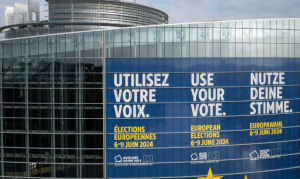Debunking, prebunking and factchecking; correcting lies, fake news and race hate – battling disinformation before this week’s European elections has become a high-stakes, full-time job for hundreds of staff across the continent.
EU leaders are so concerned over foreign interference in the polls, due to take place from Thursday to Sunday, that they have put rapid alert teams on notice to swing into action in the event of a serious incident. Officials say the quantity of disinformation has reached “tsunami levels” – but political leaders have been the slowest to catch on.
“It’s as if we have been put to sleep by the peace dividend,” said one senior EU official, referring to Europe after the second world war. “It is like we have been infected by this foreign interference. It is a silent killer.”
The threat is not expected to end when the polls for the European parliamentary elections across 27 nations close at 10pm on Sunday. A disinformation crisis unit, set up in April as campaigning began, has been asked to continue for weeks after the elections to deal with attacks on the legitimacy of the results.
“The expectation is that it is around election day that we will see this interruption of narratives questioning the legitimacy of the European elections, and in the weeks around it,” said one senior official with knowledge of the unit.
“Ten years ago we talked about election interference, but [Donald] Trump has shown us it is a lot easier, a lot cheaper just to question things. You don’t need to manipulate the vote.”
The unit allows member states to alert the rest of the bloc to threats they are seeing on their home turf. But it has also taken on a strategic role, with senior officials in the EU saying the aim is not to deal with each instance of fake news or race hate, but to go after “those who hold the trigger”.
This has allowed them to build a bigger picture to combat low-level foreign interference, particularly from Russia. “What they are trying to do is destroy the west’s way of life. Their aim is to undermine the trust in everything,” one official said.
“If you think about it, democracy is based on a free and fair vote and the assumption that citizens are informed. If you can no longer trust the information, you do not have a free vote.”
Senior EU experts who gathered to discuss the matter earlier this year heard estimates that Russia was spending €1bn on disinformation.
A Nato assistant secretary general, Marie-Doha Besancenot, told the audience of ministers, commissioners and MEPs there was “very acute awareness” that this was “a major threat”, so much so that allies agreed “hybrid operations could reach the level of an armed attack”.
The crisis unit, now running for five weeks, is the first attempt to respond in real time and take the fight to the online street. It allows each of the 27 member states to share the latest intelligence on foreign interference with fortnightly summaries listing hundreds of incidents in the bloc.
They have their work cut out for them. Every day social media channels are awash with fake or mashed-up news, some explicitly aimed at undermining Ukraine, others negatively portraying western values.
After more than two years studying disinformation, EU officials have concluded that it is not being used to help more Russia or China-friendly MEPs win seats in the upcoming elections, but to promote an anti-western narrative.
The Guardian

